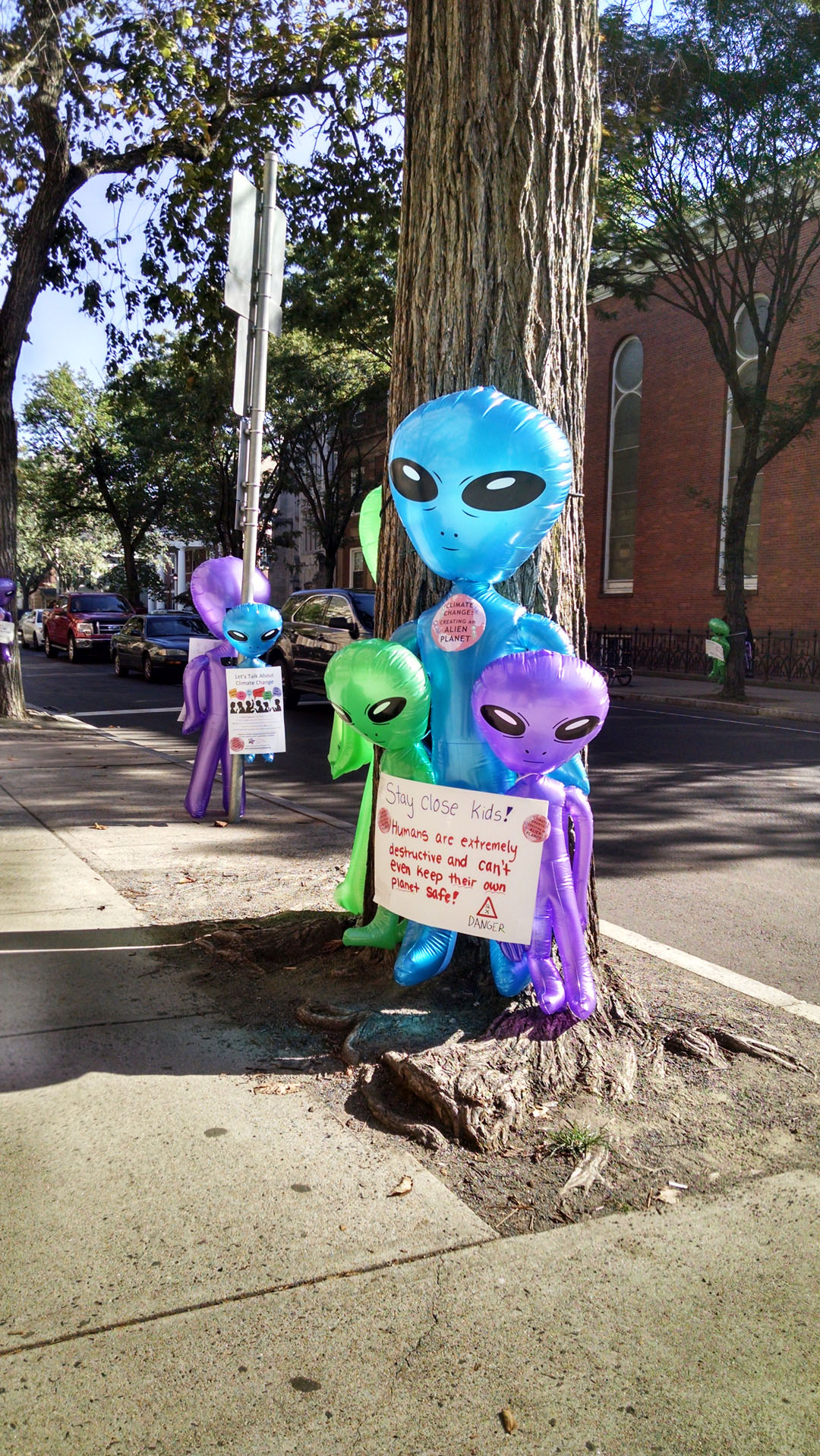
Courtesy of Healthy City Healthy Climate Coalition
Cardboard alien figurines with “Danger!” signs greeted passerbys on College and Elm streets last week. They weren’t there to promote an extraterrestrial cause but rather one right at home: climate change.
“[Aliens are] whimsical and catch people’s attention,” said Chris Schweitzer, one of the organizers. “People have been pretty much ignoring climate change, and this is a fun way to engage people.”
Schweitzer’s group, the New Haven Healthy City Healthy Climate coalition, began the cardboard campaign, which they have done at least once previously, to engage Elm City residents in climate change discussions by prompting them to wonder what the alien signs are. A multi-organization movement, the coalition aims to work with the city to develop an appropriate and effective response to climate change threats, which can be mitigated by discussion and action. But seven in 10 Americans rarely or never discuss climate change, according to a study released by the Yale Program on Climate Change Communication.
In a small city such as New Haven, where many locals know each other, the alien cardboard campaign will be especially effective, said Lisa Fernandez, associate director of the YPCCC, which was not involved in the project.
“[The project means] getting down to the local level, getting people who know each other already to speak to each other, voice their concerns and have conversations about what they can do in their own lives,” she said.
She added that many Americans often believe that there are fewer solutions to combat climate change than there actually are. Though almost all scientists agree that climate change is a threat, those in politics who believe otherwise also tend to be the most vocal, Fernandez said.
For Itai Almor ’20, who put up signs during this year’s Freshman Day of Service on Sept. 24, the initiative is a good start. The aliens are attention-grabbing and have the potential to promote discussion, he said.
In several circles on campus, especially Fossil Free Yale, conversation has already been well under way. Since 2012, the organization has aimed to encourage Yale to divest from fossil fuels by reaching out to the community and engaging the public.
“We feel that the visibility we will have created in advocating for [fossil fuel divestment] will have changed the way that people think about climate change, ethics and the political nature of the way we spend our money,” said Nathan Lobel ’17, a member of Fossil Free Yale who also does work for the YPCCC.
Climate change conversation is definitely happening on campus, especially given Yale’s decision last spring to move away from oil sands holdings, he said. But still he feels that Yale is failing to combat the negative effects of climate change, going against its motto of “lux et veritas.”
“To advocate for truth, fact and climate change is unlike any other mission because there is a scientific reality fighting against an unscientific denial,” Lobel said.
Students do not have direct contact with the Yale Corporation, the governing body that makes decisions about ethical investing, preventing them from encouraging Yale to play a greater role against climate change, he pointed out.
Schweitzer echoed Lobel’s sentiments, saying that the University could do more to spread change, rather than being an institutional bystander.
“Yale could be a very strong leader but is doing what everybody else is doing,” Schweitzer said. “[There are] very few [vocal] people out on the fringes, but there’s not that groundswell of people pushing, acting and talking about that. It’s just not enough.”
These discussions should catalyze action at the local, state and national government levels as Elm City residents take their concerns to their representatives, Fernandez said. She added that people can also make changes in their own lives, such as by living a more low-carbon lifestyle.
Groups in the Healthy City Healthy Climate coalition include the New Haven Bioregional Group and the Yale Office of Sustainability.
Interested in getting more news about New Haven? Join our newsletter!







